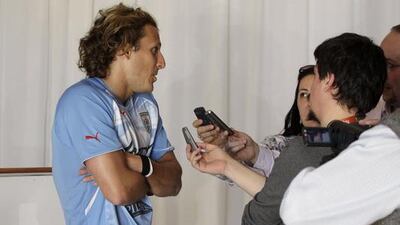Diego Forlan writes a weekly column for The National, appearing each Friday. The former Manchester United, Inter Milan and Atletico Madrid striker has been the top scorer in Europe twice and won the Golden Boot at the 2010 World Cup. He currently plays in Japan for Cerezo Osaka. Forlan’s column will be written with the assistance of European football correspondent Andy Mitten
Straight after my old club Atletico Madrid have played Barcelona on Saturday, the players of both teams will decide in the dressing room who will go out to speak to the media. It is a similar scenario at big clubs around the world. No players hide, though some like talking to the press more than others and you have to respect that.
At Atletico, I was usually sent to speak to journalists, especially if the result had not been good. I was a senior player, my place was seen as being secure because I’d scored a lot of goals at the club. As top scorer, I was probably one player who the journalists were least likely to criticise. And I didn’t mind talking, it’s part of being high profile, and flattering that people are so interested in what you have to say. But it is also a minefield.
I saw it as a challenge. I knew the journalists would crowd around and try to catch me out with a question. My challenge was not to be caught out and not say anything where my words could be twisted.
Sometimes, the journalists would revert to questions where I was supposed to answer only “yes” or “no”. It was like a trap that you had to keep trying to escape from; the mouse running from 10 cats.
I understand why they did what they did. A big headline and a sensational story is more likely to stand out and sell newspapers than me talking in clichés about being happy when we win and sad when we lose. But the trust between footballers and journalists has been slowly eroded over the years. Where once players were more honest because they felt journalists could get their views across to the fans or even help the players, now there is a lot more control and caution.
Some players don’t like to speak to the media or prefer to talk on live television so people can hear for themselves what is said, in real time. But it would be a bad thing if no footballer spoke to the media, though I’m not saying that it should ever be like in several American sports when journalists can walk into the dressing room straight after a game to talk to players. There needs to be a time to cool off and reflect. There needs to be some privacy, too.
I have seen the way footballers deal with the media. I have become cautious because I have to be. Online, your quotes can now be picked up around the world, twisted, translated and interpreted to mean the opposite of what you have actually said. Don’t get me wrong, I really enjoy doing this column, and I do trust one of two journalists, but, even then, I’ve seen my comments taken out of context, where I’ve supposedly “slammed” a player, when I have not. The British media are the worst for it, you have to watch everything you say.
I was recently invited to a draw for the 2018 World Cup in Russia. There, two British journalists kept asking me about racism in the country, and the problems at Fifa. I didn’t know them, so I had no reason to trust them. They would ask me two questions about football and then try to get me to talk about racism or Fifa. I do have opinions on the subject, but I was so wary that I said almost nothing. They kept asking, I kept saying nothing.
I have done 60-minute interviews in the past where I have been open and honest, then I have seen one minute of the footage used to represent the entire interview, taking my comments completely out of context. It sends a shiver down your spine as you realise that the viewer or listener will be forming an opinion about you based on that and you have no way of retracting what has already been published. You wonder why you did the interview in the first place.
I realise that a free press is part of a democracy and an important part of freedom of speech. If the clubs were left to do all the media then no negative news would ever get out, and that is dangerous, but clubs have to protect their players because there are so many websites looking to stand out from the crowd that they will look to have more and more melodramatic and lurid headlines.
There are other issues, too. People will interview you in their own language, but it may not be your first language. Words, or usually meanings, can get lost in translation. I do have sympathy when I see players or managers going to a country and not being 100 per cent familiar with the language. And I understand why people who do speak a foreign language, but not fluently, are reluctant to talk. They feel vulnerable and uncomfortable under the media glare. And, sadly, they are right to feel hat way.
FOLLOW US ON TWITTER @NatSportUAE

